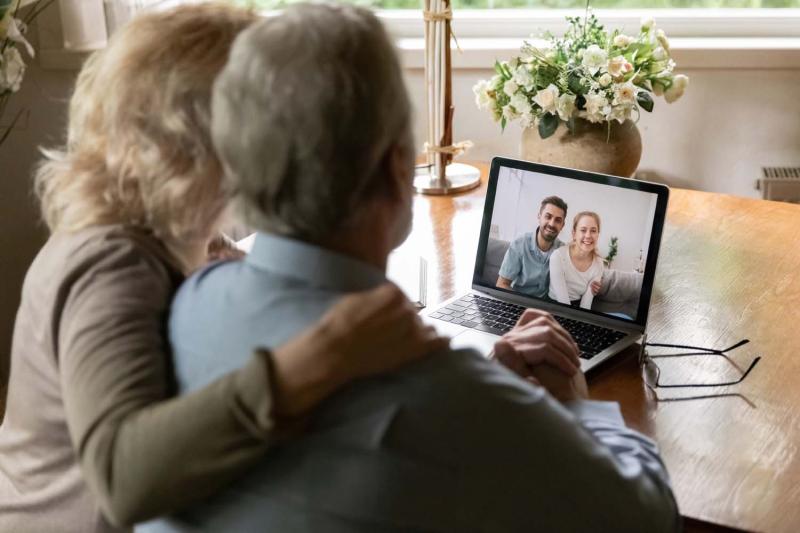Key points
- Reminiscence therapy involves conversations about an older person’s past events and experiences. It is often done using photos and videos.
- When performed as a group, reminiscence therapy can foster friendships and a sense of belonging.
- Group reminiscence therapy appears to be effective in improving life satisfaction and decreasing the loneliness of people in residential aged care.
Reminiscence therapy is a form of talk therapy. It was originally developed for use with people living with dementia but is also being used to reduce experiences of social isolation in older adults. [1] It is defined as the process of thinking about or telling someone or a group of people about past experiences that are personally significant. [2] Exercising memory in this way is thought to stimulate mental activity while boosting positive feelings to create a sense of wellbeing. Reminiscence therapy can be conducted using photos, videos, or any objects from a particular period that might serve as tangible prompts to trigger nostalgic memories. [2] There are three categories of reminiscence therapy, namely simple reminiscence, life review and life review therapy. Simple reminiscence is the recall and sharing of selected personal and shared memories and stories. It is mainly unstructured. Life review is a structured approach and is usually conducted individually, covering the whole life story chronologically. It aims to integrate negative and positive memories. Life review therapy is a more systematic approach, typically aimed at people with depression or other mental health difficulties where the aim is to re-evaluate negative memories, promoting a more positive view of life. [2]
This evidence theme on reminiscence therapy is a summary of one of the key topics identified by a scoping review of social isolation research. An evidence theme on reminiscence therapy for people with dementia is also available. If you need more information on this topic, try using the PubMed search below.
We found three reviews reporting on the effectiveness of reminiscence therapy. [1, 4-5]. They found that regular weekly group sessions in residential care showed some benefits, including:
- Lessened feelings of loneliness, immediately and in the short term.
- Fostered friendships and a sense of belonging among the participants.
- Some improvement in life satisfaction and quality of life.
- Enhanced cognitive performance and sense of identity.
- Improved residential aged care staff communication with residents.
Findings were inconclusive in reducing depression and improving overall wellbeing. There were no reported benefits for anxiety and agitated behaviours. [3]
Reviewers noted concerns about how some studies were conducted. They found the effects to be small and often not reproduced across settings. The way reminiscence therapy was delivered was also variable which makes it hard to draw strong conclusions across multiple studies. Finally, none of the reviews specified the type of reminiscence therapy used.
Reminiscence therapy might be used informally in aged care, by encouraging group conversations about the past. Staff might ask for photos or videos from family and friends of residents and use them to initiate conversations with the older person. Some topics for initiating conversations that most people can join in on include:
- Favourite holidays
- Childhood memories of the neighbourhood
- What games people played
- Food likes and dislikes
- Working life
- Supported sporting teams
- Hobbies and interests.
- Provide opportunities for reminiscence therapy, whether as part of a formal program or as part of everyday conversations with older people in aged care. Consider an intergenerational approach by inviting younger generations such as students or volunteers to be a part of reminiscence therapy. This may build connections across the ages.
- Consider creating a nostalgia space, fitted out with retro interiors, period furniture, and vintage objects such as wireless radios. Or create reminiscence kits filled with objects, photos and sounds from the past.
- Provide opportunities for staff training on reminiscence therapy.
- Woods B, Spector AE, Jones CA, Orrell M, Davies SP. Reminiscence therapy for dementia. Cochrane Database Syst Rev 2018;3(3):CD001120. doi: 10.1002/14651858.CD001120.pub3.
- Pinquart M, Forstmeier S. Effects of reminiscence interventions on psychosocial outcomes: A meta-analysis. Aging Ment Health. 2012;16(5):541-558. doi:10.1080/13607863.2011.651434
- O'Philbin L, Woods B, Farrell EM, Spector AE, Orrell M. Reminiscence therapy for dementia: An abridged Cochrane systematic review of the evidence from randomized controlled trials. Expert Rev Neurother. 2018;18(9):715-727. doi: 10.1080/14737175.2018.1509709.
- Mikkelsen ASB, Petersen S, Dragsted AC, Kristiansen M. Social interventions targeting social relations among older people at nursing homes: A qualitative synthesized systematic review. Inquiry. 2019;56:46958018823929. doi: 10.1177/0046958018823929.
- Franck L, Molyneux N, Parkinson L. Systematic review of interventions addressing social isolation and depression in aged care clients. Qual Life Res. 2016;25(6):1395-407.
- Chiang K-J, Chu H, Chang H-J, Chung M-H, Chen C-H, Chiou H-Y, et al. The effects of reminiscence therapy on psychological well-being, depression, and loneliness among the institutionalized aged. Int J Geriatr Psychiatry. 2010;25(4):380-8. doi: 10.1002/gps.2350.
Connect to PubMed evidence
This PubMed topic search is limited to home care and residential aged care settings. You can choose to view all citations or citations to articles available free of charge.
-
Reminiscence therapy

